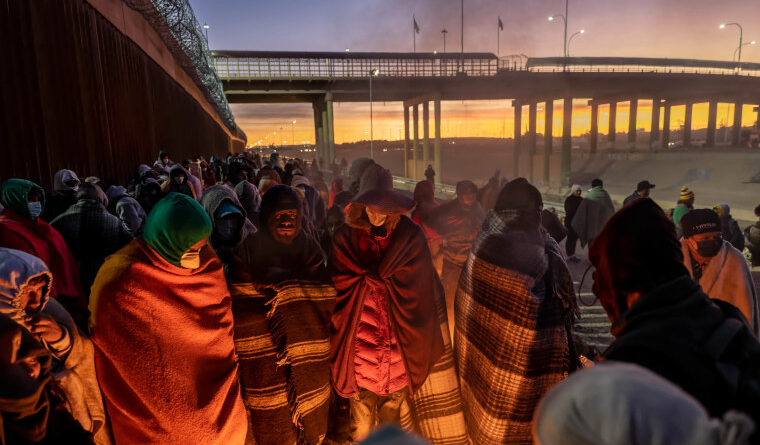
WASHINGTON – The Supreme Court on Friday breathed new life into a Biden administration policy that will set immigration control priorities by focusing on threats to public safety.
The justices, in an 8-1 vote, overturned a Texas-based federal judge’s ruling last June that blocked the policy nationwide. It was previously in effect for less than a year.
The court in a ruling written by conservative Judge Brett Kavanaugh said the challengers lacked legal standing to sue the plan, which focused on the long-standing discretion federal officials have in enforcing the laws.
Immigrants warm themselves in front of a fire at dawn after spending a night next to the US-Mexico border fence on December 22, 2022 in El Paso, Texas. John Moore/Getty Images
Kavanaugh wrote that the lawsuit filed by Texas and Louisiana was “extraordinarily unusual,” seeking to “order the executive branch to alter its arrest policies in order to make more arrests.”
But federal courts don’t typically hear such cases, he added.
Kavanaugh said “other forums remain open” for states to voice their concerns, pointing to actions Congress can take.
“We have no opinion on whether these actions are appropriate in this case,” he added.
Conservative Justice Samuel Alito was the lone dissenter, saying the court had concluded that “the only limit to a president’s power to disobey a law such as the important provision at issue is the power of Congress to use the weapons of war between branches”.
Announced in September 2021, President Joe Biden’s plan was a shift from the hardline enforcement approach that Donald Trump took as president. The Biden administration argued that with about 11 million immigrants in the United States illegally, the government must prioritize certain cases because it does not have the resources to detain and deport all of them.
Texas and Louisiana immediately challenged the plan in court, arguing that federal immigration law requires certain illegal immigrants, including those convicted of aggravated felonies, human trafficking and some gun crimes, to be detained after being released from criminal custody. Biden’s policy, which required an individual assessment of whether an immigrant is a threat to public safety or national security while the government begins the deportation process, would challenge that requirement, the states say.
Lawyers for the Biden administration argued that the president has broad discretion to set enforcement priorities.
In the ruling blocking the policy, Trump-appointed U.S. District Judge Drew Tipton said Texas had come forward because it could show that immigrants who should have been detained were in Texas and, in some cases, they had committed crimes.
Tipton found that the policy was illegal and that the government did not follow the correct procedure to implement it.
Republicans have often accused Biden of a lax approach to border enforcement and security, which they say has led to an increase in crime and an increase in the number of people entering the United States illegally. united
The Supreme Court voted 5-4 in July 2022 to reject the Biden administration’s request to immediately reinstate the policy, but agreed to accept the government’s appeal.
[ad_2]
Source link





